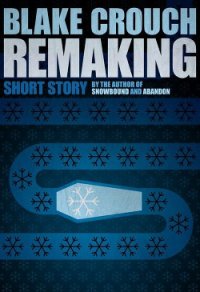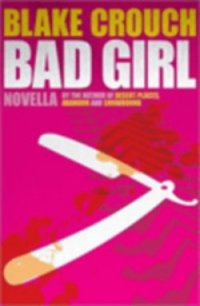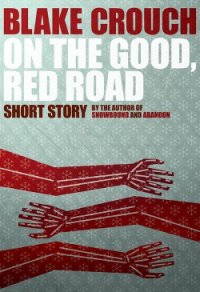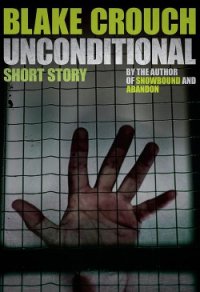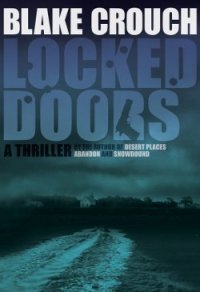Four Live Rounds - Crouch Blake (книги без регистрации бесплатно полностью .TXT) 📗
“I know I like the edge I ain’t heard ‘till now in your voice.”
Oatha thumbed back the Colt’s hammer.
“What now?” Nathan asked. “Wanna call ourselves a truce, get to the business a livin?”
“Moment you throw down that shotgun, I’ll know you ain’t full a shit on that proposition.”
Through the wall of snow Oatha had broken through, he saw the shotgun sail through the air and disappear into a snowbank.
Nathan called out, “Anytime you wanna do the same with Marion’s Colt, feel free.”
“Wish we had some spice,” Nathan said.
The steaks they’d carved out of Marion’s rump sizzled, marbled with fat, Oatha thinking the odor couldn’t even be called unpleasant. His right shoulder seemed to have a heartbeat of its own, and he wondered how many pellets of buckshot some sawbones was going to have to dig out of his back when he reached Abandon.
“I’ve smelt this before,” he said. “Or somethin like it.”
“You’ve et man?”
“No, in a San Francisco nosebag.” He thought on it for a moment, said finally, “Veal. Smells like veal.”
“Don’t it feel peculiar settin here about to—”
“If I weren’t starvin to death, maybe. But I think we’d be advised to steer away from any sort a philosophical conversation about what we’re about to do.”
They stood on the cusp of night, cloudless and moonless, the brightest planets and stars fading in against the black velvet sky like grains of incandescent salt.
Nathan flipped the ribcage. “I believe this is ready.”
The saloon was Abandon’s last—thin walls of knotty aspen, weak kerosene lamps suspended from the ceiling, three tables, presently unoccupied, and a broken-down piano.
Jocelyn Maddox stood wiping down the bar when the door opened.
“You’ve made it by the skin a your teeth,” she called out. “Thirty seconds later, it’d a been locked.”
The man paused in the doorway, as if to appraise the vacant saloon.
“Not for nothin, but it’s twenty degrees out there, and the fire’s low.” The barkeep motioned to the potbellied stove sitting in the corner, putting out just a modicum of heat at this closing hour.
The late customer made his way in, Jocelyn noticing that he walked like a man who’d crossed a desert on foot, limping toward her, and even though his hat was slanted at an angle to shield his face, she knew right away he was a newcomer.
As he reached the bar, half-tumbling into it, she saw that his face was deeply sunburnt, the tips of his ears and nose blackened with frostbite.
“You could use a cowboy cocktail,” she said.
The man leaned his hammer shotgun against the bar and reached into his frockcoat, pulled out two leather pouches, then another, and another, lining them up along the pine bar.
“One a these has money in it,” he said at barely a whisper, the pretty barkeep already uncorking a whiskey bottle, setting up his first shot.
“The hell happened to you?” she asked.
The man removed his slouch hat and set it on the barstool next to him. He lifted the whiskey, drank, said, “How much for the bottle?”
The barkeep leaned forward, her big black eyes shining in the firelight.
“Yours, free a charge, you tell me what you been through.”
He hesitated, then said, “Rode out from Silverton three weeks ago. Got waylaid by an early snowstorm. I been walkin three days to get here.”
“Was you alone?”
He shook his head, poured another shot of whiskey.
“Where’s the rest a your party? Where’s the men these wallets belong to?”
“They didn’t make it.”
“But you did.”
“Maybe I should just pay you for the bottle, ‘cause this line a questioning is gettin pretty old.”
“You ain’t gotta worry. I’m on the scout myself, and this ain’t the worst town for layin low.”
“That right.”
“For a fact. So, how’d you make it when your friends didn’t.”
“I et ‘em.”
Jocelyn threw back her head and laughed as hard as she could remember since arriving in this dying town, a fugitive in her own right, the man wondering if she was laughing because she thought he’d made a joke, or because she was crazy, and on the fence as to which reason he might prefer.
He drank the whiskey, poured himself another shot, said, “Care to hoist a glass with me?”
Jocelyn set up a tumbler for herself, and they raised their glasses, the man feeling better already. Maybe it was the hunger and the thirst, exhaustion bordering on madness, but he felt a surge of something, and though he couldn’t name it outright, having never known it, he suspected it was peace, the embracing of a thing he’d had his back to going on thirty years.
He said, “To you—what’s your name?”
“Joss.”
“To you, Joss.”
And he made a quiet toast to himself also, to finding his good, red road, to Dan and to Marion, and to Nathan of a now crushed skull, having brained the man in his sleep with a still-warm stone from the fire-ring upon which they’d roasted Marion.
He wondered what Sik’is would’ve thought of this new thoroughfare he’d found for himself, then realized he no longer cared.
As he swallowed his whiskey, the glow spreading through his stomach, to the tips of his filthy fingers, dulling the pain in his shoulder, he was overcome by a joy that sheeted his cloudy irises with tears. He felt thankful for every painful second of those twenty-one days in the wilderness, for the starvation and the thirst. He regretted nothing. If he’d never met Nathan and the boys, he’d have rolled into Abandon right on schedule, that weak, miserable fuck of a man he’d been for thirty long years since he’d watched his brothers die on Malvern Hill.
“You all right?” Jocelyn asked.
Oatha reached for the whiskey bottle.
“Strange to say, but I believe I just woke up.”
An introduction to “Shining Rock”
When I was a boy, I did a lot of backpacking with my parents and younger brother, and one of our favorite places to go was Shining Rock Wilderness in the North Carolina Mountains. One summer evening as we were setting up camp in a remote area of the wilderness called Beech Spring Gap, a gentleman came over to our camp and introduced himself. He was a burly fellow in his fifties wearing blue shorts and a vest brimming with camping accessories and various patches. He also had a machete lashed to his back and mentioned in the course of small-talk that he’d fought in Vietnam. The interaction was unsettling and more than a little awkward. I was twelve at the time but found out years later from my father that he’d been terrified, so much in fact that he and my mom had whispered in their tent late that night, debating leaving because they were afraid this man was going to come back and murder all of us while we slept. Obviously, that didn’t happen. My family struck up a friendship with the man (who turned out to be a gentle soul) and we accompanied him on future backpacking trips. But the strangeness of that initial encounter and the fear my parents must have felt never left me, and the experience inspired a short story called “Shining Rock.”
shining rock
They’d been coming to the southern Appalachians for more than a decade, and always in that first week of August, eager to escape the Midwestern midsummer heat. Last year, it had been the entire family—Roger, Sue, Jennifer, and Michelle—but the twins were sophomores at a college in Iowa now, immersed in boyfriends, the prospect of grad school, summer internships, slowly drifting out of their parents’ gravitational field into orbits of their own making. So for the first time, it was just Roger and Sue and a Range Rover filled with backpacking gear, heading south through Indiana, Kentucky, the northeast wedge of Tennessee, and finally up into the highlands of North Carolina.
